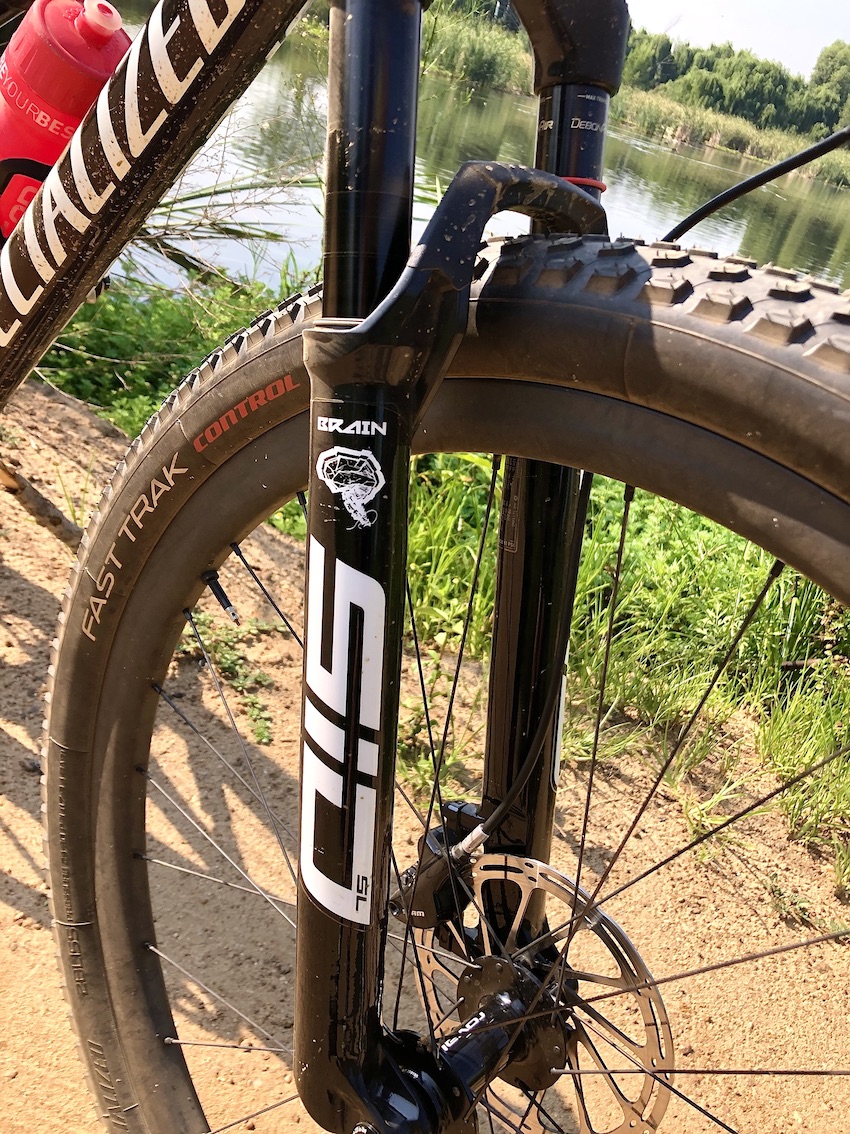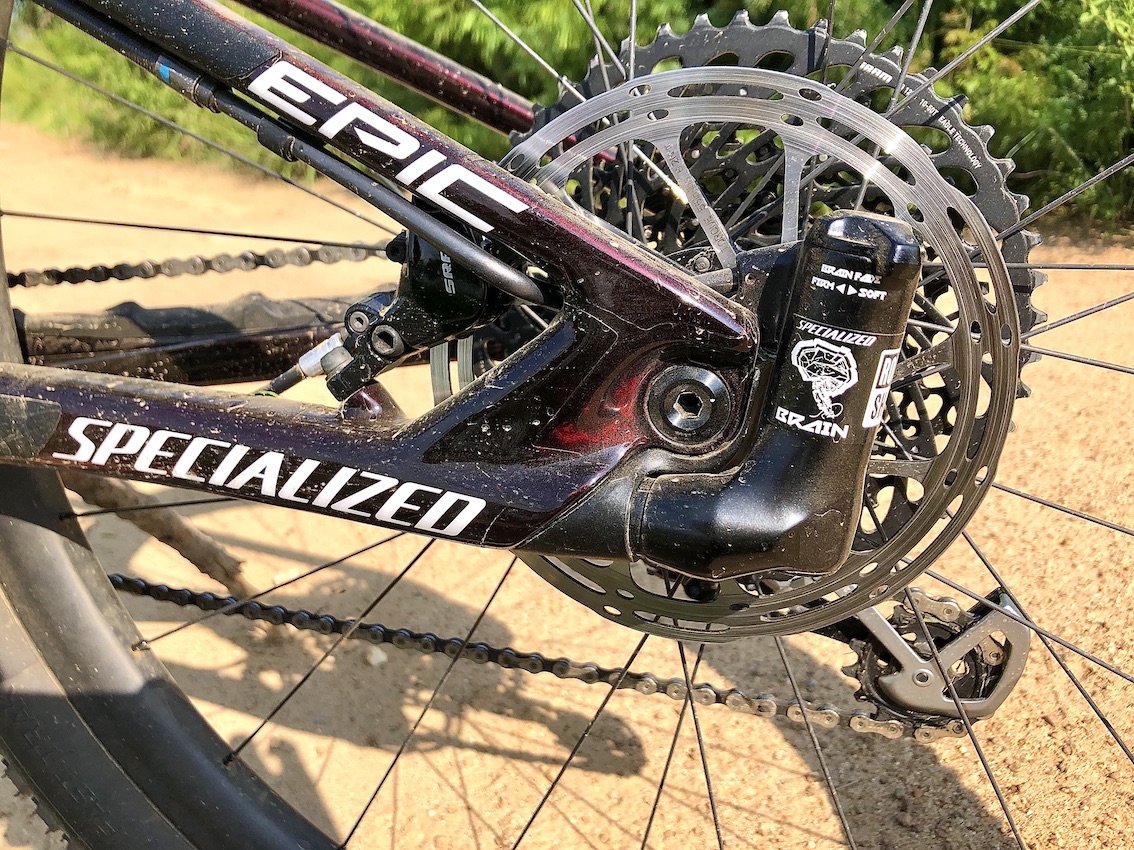It’s won more Absa Cape Epic titles than any other bike. It’s won World Championship, World Cup and Olympic titles and it’s one of the most popular high-performance marathon and XCO bikes in South Africa. It’s been fine-tuned for the 2021 edition. Here’s what we think after test-riding the new 2021 Specialized Epic Expert.
It’s been quite some time since we last rode a Specialized. So, it was refreshing when not one, but two were delivered to us in late December, a Specialized Epic Expert and a Specialized Epic Evo Expert. We’d heard a lot about the new Evo with its new ‘Brainless’ suspension design and more trail-friendly geometry and spec. It was certainly the more hyped of the two models that we were about to spend 10 days riding. More about that another time. This review specifically focusses on the Epic Expert.

First impressions
The colour caught our attention immediately. This model comes in two colours, Gloss Red Tint with White Gold decals and Satin Carbon with Spectraflair decals. This one was Gloss Red Tint and man, THAT IS A SRAY JOB! It’s basically a dried-blood red which is best viewed in sunlight because it changes hue as your line of sight shifts with what Specialized calls a colour-run finish. It reminds us of a toffee apple.
The Expert is not the top of the Epic range, but it’s not too far off. Although the wheels look a little chunky, it’s a damn light bike and the minimalist, clean design makes it look really svelte. It incorporates Specialized’s updated Brain shock suspension, with a Rock Shox Sid SL Brain fork and a SRAM X01, GX, X1 1×12 drivetrain. The Roval wheelset sees Roval Carbon rims mated to DT Swiss 350 Boost hubs wrapped in Specialized Fast Trak Control 2.3 tyres.
It’s basically a dried-blood red which is best viewed in sunlight because it changes hue as your line of sight shifts.
The Epic Expert is the third from the top of the Epic range and is specced with SRAM’s X01 1×12 Eagle drivetrain, with a X1 crankset (32-tooth ring) and a 10-50 cassette – efficient, clean. At under 1500g, the Roval Control Carbon/DT Swiss wheelset is light, but strong. The brakeset is SRAM Level TL with 160mm rotors. The cockpit is all Specialized’s alloy components and the tyres are Specialized Fast Trak Control 2.3. While it comes with a 32, it can take up to a 38-tooth chainring upfront for those with Kulhavy-like ambition.

FRAME
This is the new frame, launched in mid-2020 and claimed by Specialized to be lighter and stiffer than its predecessor. It’s Specialized’s FACT 11m carbon (one grade down from the FACT 12m on the S-Works model). It has internal cable routing and incorporates the new Brain suspension. The Brain shock is the updated version, which is firmer and quieter and easier to maintain than its predecessor. There are five Brain-fade settings. We mostly used 3 and 4 with 1 being the softest and 5 being the firmest. We set the rebound in the middle.
Significantly, for South Africans, it comfortably accommodates two full size bottles in all except the Extra Small frame size. On the topic of frame sizes, it comes in five – XS, S, M, L and XL. Rare for full-sus 29ers to come in a Small, never mind an Extra Small.
Our demo bike came with a 25mm wide rubbery frame protector around the toptube. It’s to protect the frame from a brake lever/shifter ding if the bars twist. It doesn’t sell with this protector on, but it’s a threat/challenge for certain frame sizes though. Some brands use a steering limiter to prevent this, which we aren’t wild about either. Not sure what the solution is, but it’s worth noting.

FORK
It’s a RockShox SID SL Ultimate with Brain Damper, 44mm offset and 100mm of travel. As with the Brain shock at the rear, also updated to be firmer, kicking in with less sag (15mm as opposed to 25mm of the previous edition), so small bump compliance is better. There are five Brain-fade settings with 1 being softest and 5 being firmest – and adjustable on the fly. We didn’t really adjust much while riding, setting it before the ride based on what we knew to expect on the trails and giving the rebound the middle setting.
The Ride
We didn’t have this bike for very long. It was part of a Demo Fleet that travels the country to different Specialized dealers. We were fortunate the 2021 Epic and Epic Evo fleet was at Complete Cyclist Bryanston over Christmas/New Year period when the shop was closed, so we were able to test ride it during a 10-day period. We got to ride it at Northern Farm, Hennops and The Cradle, all in Gauteng as well as Bezhoek in Mpumalanga. This offered a good range of riding, mostly singletrack, some fast and flowy and some really technical and unpredictable (at Bezhoek). As with previous editions, there’s still the Brain ‘clunk’ sound/sensation on bigger hits, but it’s softer in both sensation and sound on this version and it doesn’t seem to occur as frequently. It doesn’t affect the bike’s performance, but it is confirmation that you can’t have everything…
It comfortably accommodates two full-size bottles inside the frame.
Climbing 10/10
On long, steady climbs the Epic is quick. So efficient and smooth that you feel like you can pedal one harder gear more often. It’s also a light bike (9.98kg without pedals) and that’s always going to be a benefit on long climbs. On all other climbs (medium, short, steep, technical) it’s notably efficient as our testers discovered with a slew of Strava ascent segment PRs. There’s 15mm of sag on the Brain fork (reduced from 25mm of the previous version), which means the bike doesn’t fully ‘lock out’, but it also means it still soaks up small terrain variations seamlessly. You just have to think about line choice, not your suspension and that’s highly appealing.
Descending 9/10
With a 67.5-degree headtube angle, two degrees slacker than its predecessor and the slackest of any current XCO bike, long reach (445mm on a Medium frame), a wide-ish bar (760mm) and a low BB (324mm – 9mm lower than its predecessor) the Epic is a stable descender. Combine the fact that the Brain suspension – front and rear – just works as it needs to with its inertia valve design to activate on rough surfaces and you have loads of descending confidence. Unlike its more trail-focussed sibling, the Epic Evo, the Epic doesn’t come with a dropper seatpost, so you still need to move around the saddle on steep, technical downs.
Cornering 9/10
You’d expect the long, low geometry to penalise the Epic in corners, especially tight turns. Well, the tight turns felt good, but the longer, wider turns felt superb! The shorter 44m fork offset (other than Trek, most of its rivals use a 51-55mm fork offset), short chainstays (433mm) and really grippy Specialized Fast Trak Control 2.3 tyres all combine to deliver a super stable, fast cornering bike.
Handling 9/10
While the Brain suspension technology clearly has benefits, it also has a drawback. Standard open suspension absorbs every hit, be it small or large, but the Brain suspension needs the first hit to activate it, which means a bit more of a physical ride when you’re tackling rough terrain. If you’re a strong, conditioned rider that’s attentive to the trail ahead, you may not really notice it, but our testers did – at first. The innate trust in your suspension to deliver any poor-concentration forgiveness needs some mental readjustment with the Epic. It takes a few rides, but you do adapt accordingly. At the same time though, because your pedalling power is not being partially absorbed into your suspension, the Epic is super responsive when accelerating.
Comfort 8/10
Our longest ride was just under four hours on the Epic. The riding position feels really good and the Specialized Power saddle was comfortable. While the Brain technology suspension delivers a super efficient ride, it’s not plush. But then riders that choose to ride an Epic are more focussed on performance than comfort, so it’s not a major thing. But it is a thing.
Looks 10/10
Probably the best looking XCO/Marathon bike we have seen. Svelte, balanced, minimal cables and a paintjob that would impress Michelangelo.

The Brain shock is the updated version, which is firmer and quieter and easier to maintain than its predecessor.
THE TREAD SCORES
| Specialized Epic Expert | |
| Climbing | 10 |
| Descending | 9 |
| Cornering | 9 |
| Handling | 9 |
| Comfort | 8 |
| Looks | 10 |
| TOTAL | 55/60 |
Summary
After 19 years with a series of design updates in line with developing technology and new standards and a race success list unmatched by any other mountain bike model, you already know the Epic comes with credibility. It looks fast and rides even faster. Our testers crushed loads of Strava segment PRs, many of which were unintentional/unexpected. The same segments we use for all XC/Marathon bike tests. The Specialized Epic Expert is simply the fastest XC/Marathon bike we have ridden. If performance is important to you and budget isn’t a constraint, look at this bike first. If it’s bit out of your budget, consider the Comp, which comes with lower parts spec at R83 000.
PRICE: R117 000
WEIGHT: 9.98kg (with tubeless and bottle cage; without pedals)
More information on the Specialized Epic Expert.
There are four complete models in the new Epic range. Find out more here.
TEST-RIDDEN BY: Sean Badenhorst and Joanne Badenhorst




